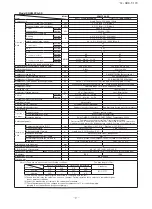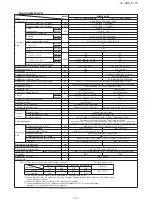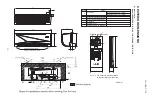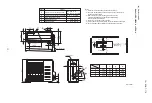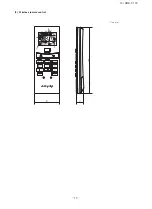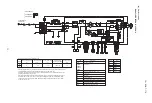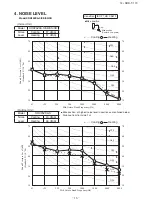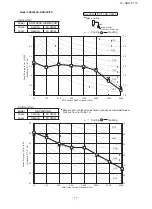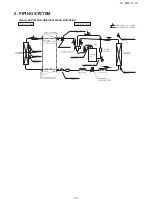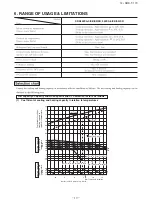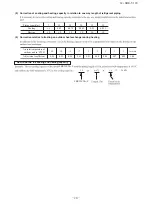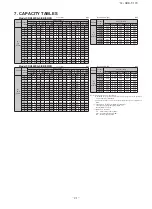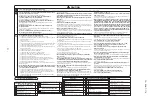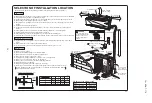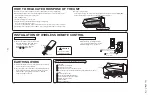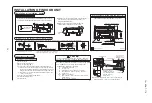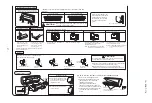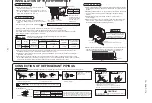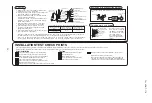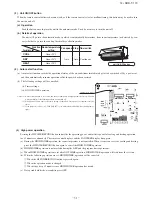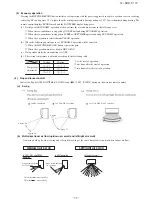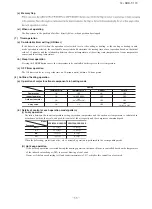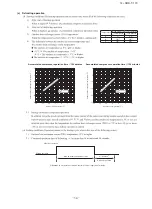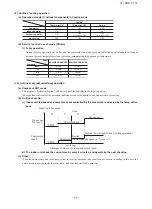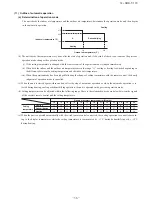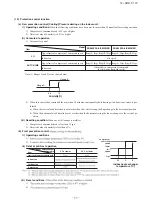
-
23
-
'14 • SRK-T-170
CAUTION
• Carry out the electrical work for ground lead with care.
Do not connect the ground lead to the gas line, water line, lightning conductor or telephone line’s ground lead. Incorrect grounding can cause unit faults such as electric shocks due to short-circuiting.
• Use the circuit breaker of correct capacity. Circuit breaker should be able to
disconnect all poles under over current.
Using the incorrect one could cause the system failure and fire.
• Install isolator or disconnect switch on the power supply wiring in
accordance with the local codes and regulations.
The isolator should be locked in OFF state in accordance with EN60204-1.
• Be sure to install indoor unit properly according to instruction manual so
that drainage can run off smoothly.
Improper installation of indoor unit can cause dropping water into the room and
damaging personal property.
• Install the drainage pipe to run off drainage securely according to the
installation manual.
Incorrect installation of the drainage pipe can cause dropping water into the room and
damaging personal property.
• Be sure to install the drainage pipe with descending slope of 1/100 or
more, and not to make traps and air-bleedings.
Check if the drainage runs off securely during commissioning and ensure the space for
inspection and maintenance.
• After maintenance, all wiring, wiring ties and the like, should be returned
to their original state and wiring route, and the necessary clearance from
all metal parts should be secured.
• Secure a space for installation, inspection and maintenance specified in
the manual.
Insufficient space can result in accident such as personal injury due to falling from the
installation place.
• Take care when carrying the unit by hand.
If the unit weights more than 20kg, it must be carried by two or more persons. Do not
carry by the plastic straps, always use the carry handle when carrying the unit by hand.
Use gloves to minimize the risk of cuts by the aluminum fins.
• Dispose of any packing materials correctly.
Any remaining packing materials can cause personal injury as it contains nails and
wood. And to avoid danger of suffocation, be sure to keep the plastic wrapper away from
children and to dispose after tear it up.
• For installation work, be careful not to get injured with the heat exchanger,
piping flare portion or screws etc.
• Be sure to insulate the refrigerant pipes so as not to condense the ambient
air moisture on them.
Insufficient insulation can cause condensation, which can lead to moisture damage on
the ceiling, floor, furniture and any other valuables.
• When perform the air conditioner operation (cooling or drying operation) in
which ventilator is installed in the room. In this case, using the air conditioner
in parallel with the ventilator, there is the possibility that drain water may
backflow in accordance with the room lapse into the negative pressure status.
Therefore, set up the opening port such as incorporate the air into the room that
may appropriate to ventilation (For example; Open the door a little). In addition,
just as above, so set up the opening port if the room lapse into negative
pressure status due to register of the wind for the high rise apartment etc.
• Be sure to perform air tightness test by pressurizing with nitrogen gas after
completed refrigerant piping work.
If the density of refrigerant exceeds the limit in the event of refrigerant leakage in the
small room, lack of oxygen can occur, which can cause serious accidents.
• Do not install the unit in the locations listed below.
• Locations where carbon fiber, metal powder or any powder is floating.
• Locations where any substances that can affect the unit such as sulphide gas, chloride
gas, acid and alkaline can occur.
• Vehicles and ships.
• Locations where cosmetic or special sprays are often used.
• Locations with direct exposure of oil mist and steam such as kitchen and machine plant.
• Locations where any machines which generate high frequency harmonics are used.
• Locations with salty atmospheres such as coastlines.
• Locations with heavy snow (If installed, be sure to provide base flame and snow hood
mentioned in the manual).
• Locations where the unit is exposed to chimney smoke.
• Locations at high altitude (more than 1000m high).
• Locations with ammonic atmospheres (e.g. organic fertilizer).
• Locations with calcium chloride (e.g. snow melting agent).
• Locations where heat radiation from other heat source can affect the unit.
• Locations without good air circulation.
• Locations with any obstacles which can prevent inlet and outlet air of the unit.
• Locations where short circuit of air can occur (in case of multiple units installation).
• Locations where strong air blows against the air outlet of outdoor unit.
• Locations where something located above the unit could fall.
It can cause remarkable decrease in performance, corrosion and damage of components,
malfunction and fire.
• Do not install the indoor unit in the locations listed below (Be sure to install
the indoor unit according to the installation manual for each model because
each indoor unit has each limitation).
• Locations with any obstacles which can prevent inlet and outlet air of the unit.
• Locations where vibration can be amplified due to insufficient strength of structure.
• Locations where the infrared receiver is exposed to the direct sunlight or the strong
light beam (in case of the infrared specification unit).
• Locations where an equipment affected by high harmonics is placed (TV set or radio
receiver is placed within 1m).
• Locations where drainage cannot run off safely.
It can affect performance or function and etc.
• Do not install the outdoor unit in the locations listed below.
• Locations where discharged hot air or operating sound of the outdoor unit can bother
neighborhood.
• Locations where outlet air of the outdoor unit blows directly to plants. The outlet air
can affect adversely to the plant etc.
• Locations where vibration can be amplified and transmitted due to insufficient strength
of structure.
• Locations where vibration and operation sound generated by the outdoor unit can
affect seriously (on the wall or at the place near bed room).
• Locations where an equipment affected by high harmonics is placed (TV set or radio
receiver is placed within 1m).
• Locations where drainage cannot run off safely.
It can affect surrounding environment and cause a claim.
• Do not install the unit near the location where leakage of combustible
gases can occur.
If leaked gases accumulate around the unit, it can cause fire.
• Do not install the unit where corrosive gas (such as sulfurous acid gas etc.)
or combustible gas (such as thinner and petroleum gases) can accumulate
or collect, or where volatile combustible substances are handled.
Corrosive gas can cause corrosion of heat exchanger, breakage of plastic parts and etc.
And combustible gas can cause fire.
• Do not use the indoor unit at the place where water splashes may occur
such as in laundries.
Since the indoor unit is not waterproof, it can cause electric shocks and fire.
• Do not install nor use the system close to the equipment that generates
electromagnetic fields or high frequency harmonics.
Equipment such as inverters, standby generators, medical high frequency equipments
and telecommunication equipments can affect the system, and cause malfunctions and
breakdowns. The system can also affect medical equipment and telecommunication
equipment, and obstruct its function or cause jamming.
• Do not place any variables which will be damaged by getting wet under the
indoor unit.
When the relative humidity is higher than 80% or drainage pipe is clogged, condensation
or drainage water can drop and it can cause the damage of valuables.
• Do not install the remote control at the direct sunlight.
It can cause malfunction or deformation of the remote control.
• Do not use the unit for special purposes such as storing foods, cooling
precision instruments and preservation of animals, plants or art.
It can cause the damage of the items.
• Do not install the outdoor unit in a location where insects and small
animals can inhabit.
Insects and small animals can enter the electric parts and cause damage or fire. Instruct
the user to keep the surroundings clean.
• Do not use the base flame for outdoor unit which is corroded or damaged
due to long periods of operation.
Using an old and damage base flame can cause the unit falling down and cause personal injury.
• Do not use any materials other than a fuse with the correct rating in the
location where fuses are to be used.
Connecting the circuit with copper wire or other metal thread can cause unit failure and fire.
• Do not touch any buttons with wet hands.
It can cause electric shocks.
• Do not touch any refrigerant pipes with your hands when the system is in
operation.
During operation the refrigerant pipes become extremely hot or extremely cold depending
the operating condition, and it can cause burn injury or frost injury.
• Do not touch the suction or aluminum fin on the outdoor unit.
This may cause injury.
• Do not put anything on the outdoor unit and operating unit.
This may cause damage the objects or injury due to falling to the object.
• Do not clean up the unit with water.
Standard accessories (installation kit)
Accessories for indoor unit
Necessary tools for the installation work
Vacuum pump
Vacuum pump adapter (Anti-reverse flow type)
(Designed specifically for R410A)
Gauge manifold
(Designed specifically for R410A)
Charge hose (Designed specifically for R410A)
Flaring tool set (Designed specifically for R410A)
Gas leak detector (Designed specifically for R410A)
Gauge for projection adjustment (Used when
flare is made by using conventional flare tool)
Pipe bender
10
11
12
13
14
15
16
17
Plus headed driver
Knife
Saw
Tape measure
Hammer
Spanner wrench
Torque wrench
[14.0
~
62.0N·m (1.4
~
6.2kgf·m)]
Hole core drill (65mm in diameter)
Wrench key (Hexagon) [4m/m]
1
2
3
4
5
6
7
8
9
Installation board
(Attached to the rear of the indoor unit)
Wireless remote control
Tapping screws
(for installation board ø4 X 25mm)
Battery [R03 (AAA, Micro) 1.5V]
Q’ty
1
1
5
2
1
2
3
4
Option parts
Sealing plate
Sleeve
Inclination plate
Putty
Drain hose (extension hose)
Piping cover
(for insulation of connection piping)
Remote control holder
Wood screws
(for remote control holder ø3.5 X 16mm)
Q’ty
1
1
1
1
1
1
1
2
a
b
c
d
e
f
g
h
• Model name and power source • Refrigerant piping length • Piping, wiring and miscellaneous small parts
Check before installation work
Air-cleaning filters
Filter holders
(Attached to the front panel of indoor unit)
Grommet
Drain elbow (Heat pump type only)
2
2
Q’ty
1
1
Accessories for outdoor unit
5
6
7
8

